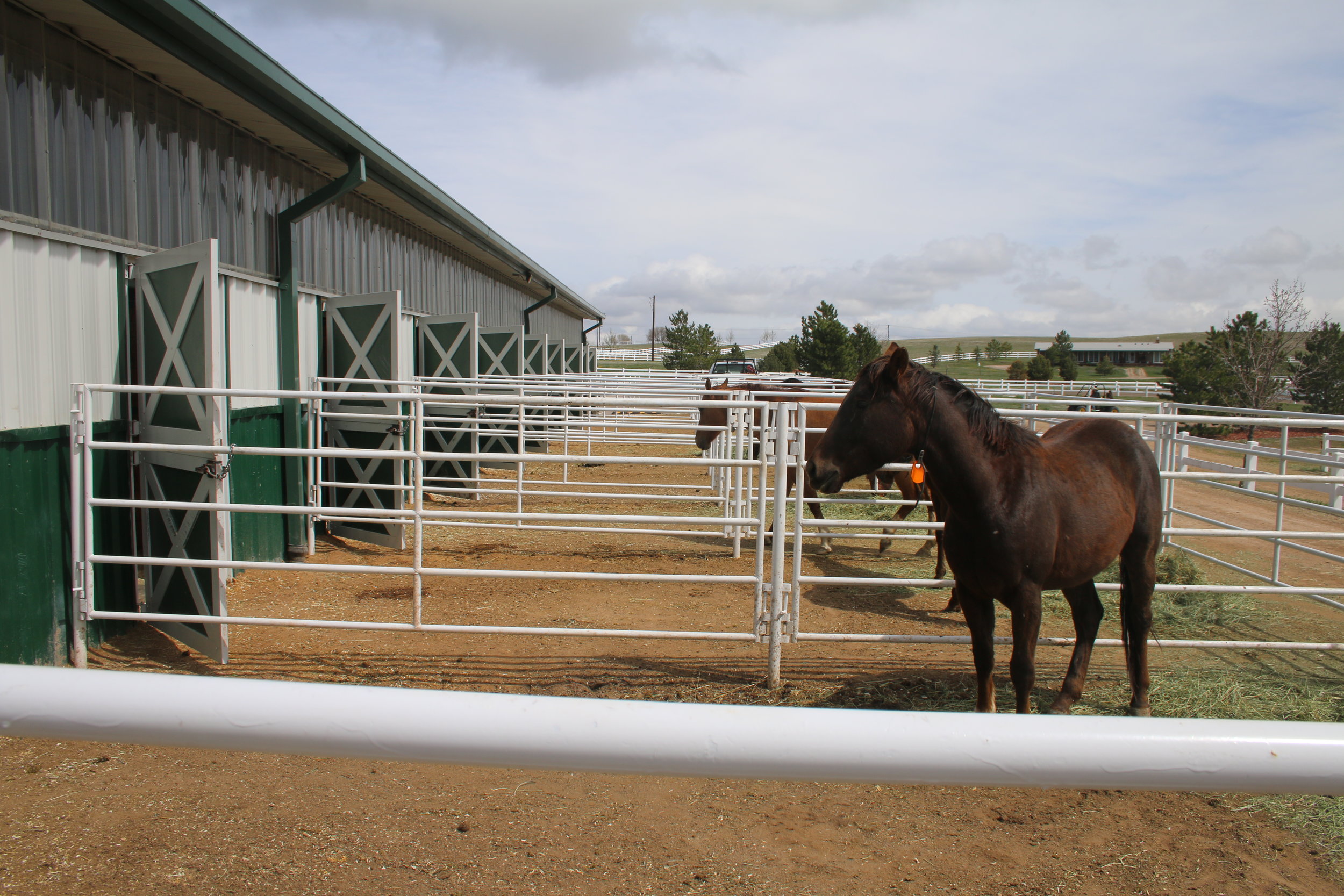Horses and Harmony at Harmony Equine Center in Colorado
Home on the Range
Just four miles east from Castle Rock south of Denver, you encounter some of Colorado’s most scenic ranch country. The rocky bluffs of Franktown give way to green undulating pastures, wooden fences and long gravel roads leading to homes along Highway 86. This area is not quite the plains, but isn’t quite the foothills either. The bucolic setting is where abused Colorado animals learn to be whole again. Welcome to Harmony Equine Center.
This 168-acre sanctuary resides under the watchful mantel of Gateway Mesa and is owned and run by the Denver Dumb Friends League. The DDFL was founded over a century ago to provide a voice for voiceless animals and is one of the largest animal shelters in Colorado. The organization has its main shelter and administrative headquarters in south Denver and a second adoption facility, the Buddy Center, in Castle Rock. In 2012 DDFL opened Harmony Equine Center.
Harmony is for equines only: Horses, ponies, donkeys and mules. Also the organization only takes in horses that come from impound situations. That means all animals were seized by law enforcement because of abuse and/or neglect. Owners cannot surrender horses to the sanctuary like a dog or cat.
Upon exiting a car from the parking lot, one can immediately hear the chirps of birds in the trees and the even louder frogs in the nearby irrigation ditch. In the distance a tractor hums. The green grounds are immaculate and a white fence surrounds the property. The main building has a few vehicles are sprinkled in the driveway. On this sunny day, the horses enjoy their outside paddocks dining on hay.
Outdoor paddocks are full at Harmony. Photo by Carrie Dow.
Garret Leonard is the Director of the facility. As he enters the main building hallway, his tall slender frame is bookended by a dark cowboy hat on his head and muddy spurs on his boots, which jangle as he walks down the hallway. He jokes that he “came with the property.” The DDFL purchased the ranch that Leonard was already running. The ranch purchase was secured by a donation from media mogul John C. Malone and his wife Leslie. The Malone’s have also agreed to donate $300,000 per year for 10 years to help with expenses. However, the center relies on donations from the community and from volunteers as well. When purchased, the ranch already had several building and barns in place. The DDFL did a few updates, like turning part of the arena building into a classroom, but the property already had most of what they needed. Today, the ranch has three barns, 26 pastures and turnouts, two indoor riding arenas and the education center.
Starting this year, Leonard says the facility will begin taking in transfers of horses, up to 125, from other rescues, mostly from surrounding states like Nebraska, Texas, Arizona, and New Mexico. The goal is to have more adoptable horses. The horses will receive 90 days of training from Harmony and then returned.
The Center has four full-time trainers, two along with Leonard, live on the property. There are 11 full-time staff members and about 80 volunteers. The facility currently houses 77 horses, but has capacity for up to 100 horses. Joan Thielen, Communications Director for the DDFL says they try to keep between 70 and 90 animals at a time. That way they always have room for more when the inevitable phone call comes.
The need for this facility was apparent because law enforcement couldn’t handle the care or cost to seize horses, especially when the recession hit in the mid-2000s. Many people could no longer afford to take care of their horses and left them to pasture, often to starve. Colorado Sheriff’s Offices were inundated with cases, but the court process takes a long time. Impounding means horses can be stuck in legal limbo for months. If a Sheriff’s Office takes in horses, the money to care for them comes out of their department budget and Leonard says the cost for 20 horses can be up to $50,000. Before the Equine Center, Leonard says Sheriff’s Offices often “looked the other way” when dealing with horse neglect cases because they simply couldn’t pay for the horses’ care while in custody.
Indoor arena and training center at Harmony. Photo by Carrie Dow.
That’s when the DDFL stepped in. The DDFL offers these very services to law departments at NO COST. The Center takes in, cares for, and also collects evidence for law enforcement. Volunteer veterinarians provide medical care. The staff also provides help writing warrants and will even testify to help the horses. Everything is funded by the generous donors of the Denver Dumb Friends League.
“Our donors are key to everything we that do,” says Leonard. “We don’t get any money from the Sheriff and very rarely do we ever get restitution from a court case. We underwrite this whole project so that horses don’t have to stand out there suffering and starving.”
Impounded horses are then held until they go through the court process. After being released from the courts, the horses are evaluated for behavior and training can begin.
Leonard says the training the horses receive is considered “natural horsemanship” and the purpose is to create an all-around adoptable horse. Horses are not trained for specific skills, like ranching or trail riding. However, those who are looking for more specific horse skills, like jumping, Leonard will recommend other organizations. To be adoptable, horses must be halter broke, pick up their feet, stand for the farrier (a person who handles horses’ hooves) and be loaded into trailers. They also need to be ridden and most Harmony horses are ridden daily.
Healthcare center, where new horses are evaluated and treated. Photo by Carrie Dow.
To adopt a horse, the Center will check out the potential adopter as much as the adopter checks out the horses. Upon arriving at the Center staff will ask what kind of horse you are looking for and what your skills are. Then they will show you a horse or horses that they think will fit your needs and skill level. When you find a horse you like, you then meet with that horse’s trainer and together will decide if you both are a fit. Once the interview process is done, an investigator from the Colorado Humane Society will conduct a site visit to ensure your property is suited for horses. A property must have good fencing, access to water, no debris and a safe environment. While it seems drawn out, Leonard says the process only takes 4-5 days. In 2018, 145 horses were adopted into new homes and the transfer training program assisted 158 horses.
Like other animal shelters, volunteers are an important part of the organization. The Center could not survive without them. Something to keep in mind at the Equine Center, however, is that volunteers do not train or ride the horses. Most have minimal contact with them. This is important for the safety of the volunteers and horses.
Volunteers are asked to make a three-month commitment of three hours a week when working with the Center. This commitment is actually less than the six-month commitment the Denver shelter asks for. The reason is because the job involves much physical labor: cleaning stalls, moving hay bales, and storing equipment. Leonard says that a volunteer’s main responsibility is to clean the facility.
Indoor paddocks. Photo by Carrie Dow.
During this period, volunteers do not come into contact with horses at all. After this six-week commitment, volunteers can then take a horse handling class where they will be taught how to halter, lead and groom horses. If the volunteer does not pass the class, they cannot handle horses, but can still continue to volunteer at the facility.
Horses are organized by behavior into three groups and those groups are set up in a familiar way, Green Blue and Red. Green means easy, Blue is intermediate, and Red means staff only. After a volunteer has passed the horse handling class they can handle horses designated green and in some cases blue. Staff only handle horses designated red. Leonard says this works well for Harmony and that a large number of volunteers actually come from Denver. He says most are city folk looking to get their “horse fix.” To volunteer, simply fill out the volunteer form on the DDFL’s website.
For Leonard, a horse that is suffering is not acceptable and he says everyone should evaluate themselves and their capability before purchasing a horse.
“Horses are a luxury item, not a necessity,” says Leonard. “Where a dog and a cat in a home feels like more of a necessity for a family. That pet holds that family together, well horses are a luxury item. They’re expensive. You have to have different care for them; you have to have different property for them.”
“A lot of the stuff we see is just poor horse ownership.” He continues. “It’s not that the people are bad, it’s they don’t have the skills to know how to take care of them.” He goes on to say, “A lot of it is just education. So if we get a call of a cruelty case, investigators will meet with them and figure out what’s wrong here. Let’s not go in with a warrant and try to take your horse. We don’t want your horse. We want you to care for your horse. So let’s help you figure out how to do that.”
Harmony Equine Center is located on Highway 86 just west of Franktown, CO.
The bucolic setting of Harmony Equine Center in Franktown. Photo by Carrie Dow.












